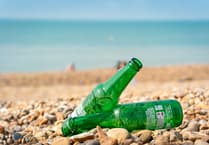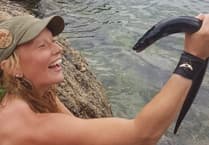A sought-after seafood delicacy which can sell for hundreds of pounds at top restaurants has been discovered on Ynyslas beach.
Goose barnacles - an ‘unmistakable’ pearl-coloured shellfish - were found clinging to a lost buoy at the beach near Borth in Cardigan Bay on Sunday (15 January).
The crustaceans - considered one of the world’s rarest and most valuable seafoods - have also been spotted on the coastline in Pembrokeshire by fortunate ramblers in the last few days.
If sufficiently large and kept extremely fresh, they are a delicacy for top chefs in Spain and Portugal – and can cost customers upwards of 200 euros per kilogram.
It is relatively rare for the distinctive crustaceans to be spotted in Wales but they are usually found washed up after stormy weather.
The largest and most sought-after barnacles tend to attach themselves to rocky coast in the treacherous surf – making them high-value due to the dangers faced while collecting them.
Like other stranded animals found on Welsh coastlines in the last week, they could have been pushed into unchartered Welsh waters by recent strong Gulf Stream winds.
The barnacles recovered in Ynyslas are unlikely to be high value due to their size.
The Wildlife Trusts’ website says: “Goose barnacles live attached to rocks, ships, ropes or flotsam floating out at sea.
“They've even been spotted on a chunk of spaceship that washed up in the Isles of Scilly!
“They are also known as a gooseneck barnacle and have a long fleshy stem that looks like a black neck.
“The stem or peduncle is topped with a chalky white shell that houses the main body of the barnacle.
“In many places in the world they are a delicacy - in fact, in days gone by, any ships arriving in Cornwall with goose barnacles on the hull were a real money-spinner.
“The goose barnacles would be scraped from the hull and sold for food.
“Goose barnacles are unmistakeable. They grow in dense aggregations on flotsam, with delicate chalky white shells anchored to the object with a fleshy black stalk (or peduncle).”





Comments
This article has no comments yet. Be the first to leave a comment.